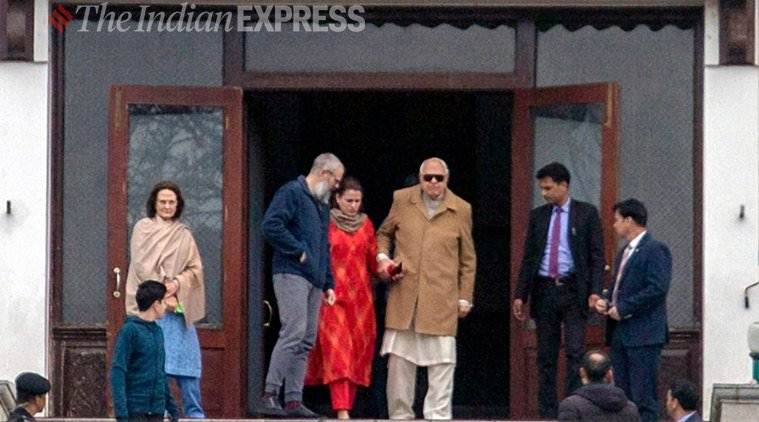
The Indian Express
NC leadership should express party’s stand on J&K special status, says top leader
While agreeing that the Centre’s response could be “ugly and brutal” if the party breaks its silence, former J&K minister Aga Roohullah asked his NC colleagues to be “ready for that”.
by Bashaarat MasoodSeeking to break the party leadership’s silence on abrogation of Jammu and Kashmir’s special status and bifurcating the erstwhile state into two Union Territories, a senior National Conference (NC) leader has asked what is stopping his party and its leaders from expressing the NC’s “principled stand” on the issue.
While agreeing that the Centre’s response could be “ugly and brutal” if the party breaks its silence, former J&K minister Aga Roohullah asked his NC colleagues to be “ready for that”.
Roohullah told The Indian Express: “The National Conference has a known principled stand for the last 70 years: autonomy, (Article) 370 and the conditions of accession to India, Constitutional guarantees. All those were violated illegitimately on August 5 [last year, when special status to J&K was withdrawn].”
He said the party does not need “permission from (New) Delhi” to express what happened on August 5, 2019.
“The only apprehension is, it may cause a backlash, in a sense that Delhi will respond in a very ugly (way); their response would be more brutal. But my point is, be ready for that. It is not all about rosy gardens. If you think the political process means only elections, (getting to) the Secretariat and chairs, we are misplaced. We are then not doing justice to our job, to our people.”
A religious cleric with hold among J&K’s Shia population, Roohullah is an important and influential NC leader and has been a three-time legislator.
He said the party has reasoned that it is silent on these issues because the NC working committee could not meet, as several of its members are detained under the Public Safety Act (PSA), or are detained at home.
Roohullah, also a member of the working committee, said: “They (party leaders) have their own reasons; they have their own justifications, to which I partially agree and partially do not. They give justification — they are my colleagues, and I do not separate myself from the party; my colleagues –– that unless they (working committee members) are released, and then meet and collectively decide, we should not speak, as it is the mandate of the working committee.”
But, he said, “we don’t need a mandate from the working committee to express our principled stand. We were betrayed — entire Jammu and Kashmir was betrayed, the instrument of accession was torn apart illegitimately. To make an opinion or to express what happened on August 5, you don’t need the committee’s mandate. What you need the working committee for is to decide the methodology — how we go about it, what kind of response (party should give), the kind of reply, process, the methods we adopt…”
After he was released from jail in March, former J&K chief minister and NC vice-president Omar Abdullah had said that he would talk politics later — “let’s first fight this coronavirus”, he had said. But Roohullah asked if the pandemic has not stopped the Union government, what is “stopping us”.
Party chief Farooq Abdullah has also been silent on the issue of abrogation of J&K’s special status since his release from detention.
“The other side, which is New Delhi, as Ram Madhav put it, has taken it to its logical conclusion. They did everything they wanted to do and turned us into dust. They are doing their job, (but) what stops us,” he asked. “They are not stopped by the pandemic…what stops us? This pandemic isn’t going anywhere, anytime soon. Whatever happens during that course, whatever is happening, we may not even be in a position to respond.”
On Sunday, Roohullah had tweeted his response to an article written by his party colleague Tanvir Sadiq, who is also Omar Abdullah’s political adviser. Sadiq had written that it is “time for reconciliation and reaching out to people of Jammu and Kashmir”, for which a beginning could be made by releasing “all political prisoners arrested post-August 5, revisiting of domicile laws and lifting of curbs on the internet and telecommunication”.
He had also called for the beginning of a political process once the pandemic ends.
Roohullah told The Indian Express: “I will not jump the bridges, it is too early. I will accept it as his (Sadiq’s) personal opinion; and that whatever he said, whatever he wrote was in his personal capacity. It would be too immature to say that it is the opinion of every one, but I feel if somebody give his opinion, which I feel is not good or, to be more blunt, is betrayal of our conscience, to our principles, I made my own opinions with regards to that.
“I take it (Omar’s statement) very sincerely. He said we have a pandemic around and it is not time for politics. Bu then my question is to every one of my colleagues: why talk about reconciliation then? Why talk about alternatives then? If the pandemic is equally there for (Article) 370, pandemic is pretty much there about reconciliation, which is opposite of 370. So if you want us to be silent for certain time, stay silent then; don’t give these contradictory opinions.”
Roohullah said he is doing “politics of conscience” and that any individual decision or collective decision of party would not impact his principled stand.